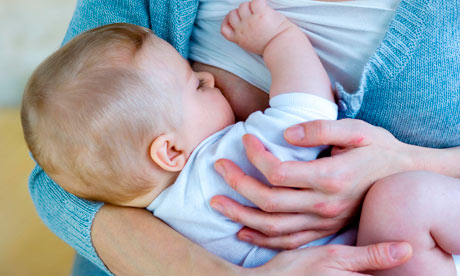
To the outrage of breastfeeding campaigners and probably the utter confusion of most women with small babies, scientists today advocate rewriting the rulebook to drop the current guidance that says mothers should breastfeed exclusively for the first six months of their child's life.
It was 2001 when the World Health Organisation announced that exclusive breastfeeding for six months was best for babies. In 2003 the then Labour minister Hazel Blears adopted the recommendation for the UK.
But today, in the British Medical Journal, doctors from several leading child health institutes say the evidence for the WHO guidance was never there – and that failing to start weaning babies on to solids before six months could be harmful.
Mary Fewtrell, from the childhood nutrition research centre at the University College London Institute of Child Health, said probably no babies had been harmed, as few mothers in the UK manage to stick to six months of nothing but breastmilk with a baby who by then is taking an interest in the contents of people's plates. "About 1% were doing it in 2005, although probably more now," she said. "But only about 20% breastfeed at all at six months. It is not a common behaviour."
Fewtrell and colleagues from Edinburgh and Birmingham universities say that is partly because mothers often find by that stage that their babies want more. Their trawl of the existing evidence shows, they say, that babies also need more.
According to the paper, failing to start weaning on to solid food (they are not talking about formula milk) before six months appears to raise risks for the baby. Evidence that was unavailable when the WHO made its recommendation suggests they have a greater chance of iron deficiency anaemia, "known to be linked to irreversible adverse mental, motor or psychosocial outcomes." Unlike the US, the UK does not have a screening programme for iron deficiencies in children, so it is impossible to say if there have been problems.
Other evidence, they say, suggests that babies not introduced to certain foods earlier than six months may have a higher incidence of food allergies. "Countries where peanuts are used as weaning foods have low incidences of peanut allergy (Israel, for example)," they write.
The third potential issue is coeliac disease. The numbers of children developing coeliac disease rose in Sweden following advice to mothers to delay the introduction of gluten into their child's diet until after six months, and it fell when the recommendation reverted to four months.
Fewtrell said she supported the WHO recommendation, but argued that it needed to be interpreted differently in different countries. Exclusive breastfeeding protects against infections, which is critical in developing countries, but less important in the UK where hygiene and sanitation are better. "There's only one piece of evidence relevant to babies in the UK – a slightly decreased risk of gastroenteritis," she said.
She said she hoped the government's scientific advisory committee on nutrition, which is looking at infant feeding, would take on board their findings.
Advocates of breastfeeding point out that the recommendation not to wean until six months has substantially cut the numbers of women who introduced solids before four months – from 85% in 2000 to 51% in 2005. But Fewtrell said that was no argument for misleading women.
"I really want to emphasise we are not in any way anti-breastfeeding, particularly in the long term," she said. "We're extremely pro-breastfeeding. We would go along with recommendations to breastfeed exclusively for four months."
Pro-breastfeeding groups were dismayed, however. Unicef pointed out that it did not contain any new experimental data and said the UK policy had been a success as greater numbers of mothers now delayed the introduction of solids until after four months. It added that most early foods "are not nutrient dense and do not provide quantities of iron and zinc".
Patti Rundall, of the campaigning group Baby Milk Action, said moving to weaning at four months would be "a regrettable and backward step that is out of step with current scientific thinking".
She accused the paper's authors of taking funds from the babyfood industry. The paper acknowledges that three of the four authors "have performed consultancy work and/or received research funding from companies manufacturing infant formulas and baby foods within the past three years".
Fewtrell was unapologetic. Ideally, mothers would give their babies fresh food, including meat, for iron. "This is not an attempt to promote commercial weaning foods," she said. "We are a university and Medical Research Council-funded group." They had advised babyfood manufacturers because they were specialists in child nutrition, she said.
"Some organisations are all too happy to quote our data when it supports breastfeeding," she said. "They are choosy in what they will allow."
Justine Roberts of Mumsnet said women needed clarity after at least three changes of policy in her own child-rearing years. "A lot of mums work quite hard, and it is quite hard work trying to exclusively breasfeed for six months without introducing solids. If that turns out not to be correct advice, we'd like to know as soon as possible."
The Department of Health said it would review the research, adding: "Breast milk provides all the nutrients a baby needs up to six months of age and we recommend exclusive breastfeeding for this time." "Mothers who wish to introduce solids before six months should always talk to health professionals first."
• This article was amended on 14 January 2011. In the original, the heading said: Six months of breastfeeding alone could harm babies, scientists now say. This has been expanded to include the full wording that appeared in the Guardian newspaper.

